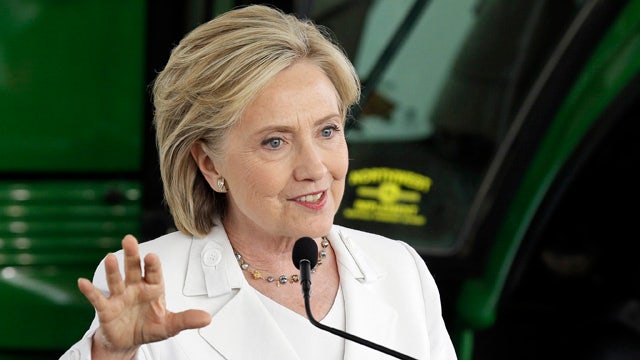Did Hillary Clinton know emails on server were classified?
Hillary's defense coming under scrutiny
The daily revelations over classified information finding its way onto Hillary Clinton's personal email server are raising perplexing questions for former government officials who wonder how classified information made its way onto the former secretary of state's non-classified server -- especially since the two systems are not connected.
"It is hard to move classified documents into the non-classified system. You couldn't move a document by mistake," said Willes Lee, a former operations officer for the U.S. Army in Europe and former operations officer for the Joint Chiefs of Staff.
State Department spokesman Alec Gerlach confirmed the two systems don't connect. "The classified and unclassified system are separate and you cannot email between the two," Gerlach told Fox News.
The Clinton campaign adamantly denies any emails traversing Clinton's homebrew server were marked classified at the time. The intelligence community inspector general says "potentially hundreds" of classified emails may be in the mix, but acknowledges at least some were not properly marked.
So if the Clinton denial is to be believed, individuals in her inner circle would have simply typed or scanned classified information into a non-classified system without regard for its contents. In this case, emails would have started in, and stayed in, the unclassified system -- albeit improperly, based on the findings of the intelligence inspector general.
But if it turns out emails literally jumped from the classified to the non-classified system -- something the State Department claims cannot happen -- it would seem to point to Clinton's staff going to great lengths to create a work-around to do so.
A government employee doing so would commit numerous felonies, according to Bradford Higgins, who served as assistant secretary of state for resource management and chief financial officer from 2006-2009. "A violation, in addition to criminal charges and potential prosecution, would likely mean that person who committed the breach would never again be given a security clearance," Higgins said.
The State Department has indicated it sees no evidence of this criminal scenario. Classified documents are supposed to be marked, and State Department spokesman John Kirby told reporters at an Aug. 13 briefing "we have no indications" any classification markings were stripped. Clinton's defense has been that the emails in question were later deemed classified, after they traversed her server.
But Higgins is skeptical.
"Emails don't change from unclassified to classified. The originator of the email decides the classification before it is sent out based on basic protocols, not subsequent readers," Higgins said. "I believe it would be highly unusual for an unclassified email to later become classified."
Regardless of how it happened, Lee faulted Clinton and her staff.
"It is not as if Hillary Clinton and her staff do not know the rules and the law," he said.
"I think what it is going to come down to is very sloppy, unprofessional procedures," said Steven Bucci, assistant to former Secretary of Defense Donald Rumsfeld and deputy assistant secretary of defense who is now at The Heritage Foundation.
While government watchdogs looking into the Clinton emails say classified material was improperly sent or received, so far they have not publicly alleged that emails jumped between systems.
I. Charles McCullough, III, inspector general of the intelligence community, and Steve Linick, inspector general for the Department of State, said in a July 24 statement that of 40 emails the State Department allowed them to review in an audit, four contained intelligence community-derived information that remains classified today. But the information did not contain classified markings or dissemination controls, they said.
They said: "This information should never have been transmitted via an unclassified personal system."
McCullough said, though, that "we were informed by State FOIA officials that there are potentially hundreds of classified emails within approximately 30,000 provided by Secretary Clinton."
He reiterated that while emails they saw were not marked as such, some should have been "handled as classified, appropriately marked, and transmitted via a secured network."
One of the emails that sparked the FBI probe was sent in April 2011 from Clinton aide Huma Abedin and covered intelligence from three agencies, Fox News first reported. Other emails that contained classified information came from diplomats with confidential material, according to the AP.
Pro-Clinton super PAC Correct the Record, which maintained Clinton's use of personal email followed the precedent of other secretaries of state and she did not violate any laws, said in a recent statement that government agencies often classify information differently from each other and that "government agencies also are notorious for over-classifying material."
Another security concern is Clinton attorney David Kendall's possession of thumb drives, which he recently gave the FBI.
The State Department would not provide details on the documents given to Kendall. "Removable drives need to be approved," Gerlach said, adding that he cannot get into specific security requirements.
Clinton and her staff may have had the ability to use thumb drives, but that would be unusual at the State Department, and it also defeats the purpose of a top secret computer, a classified printer, or what's known as a Sensitive Compartmented Information Facility (SCIF), Higgins said.
A SCIF is a room or building where classified material can be reviewed, designed and built so nothing electronic can go in or out except over secured lines.
Higgins noted other differences in how classified and non-classified systems are handled. "At State, your classified hard drive sits in your safe and only comes out for occasional use and must be returned to the safe before you leave at night," he said. "Even printing out top-secret needs a top-secret printer, which is carefully monitored."
He added, "As I recall at State, classified computers didn't have ports for thumb drives to download secret info."
The security implication is clear, he said: "Everything on her server has been compromised."













































